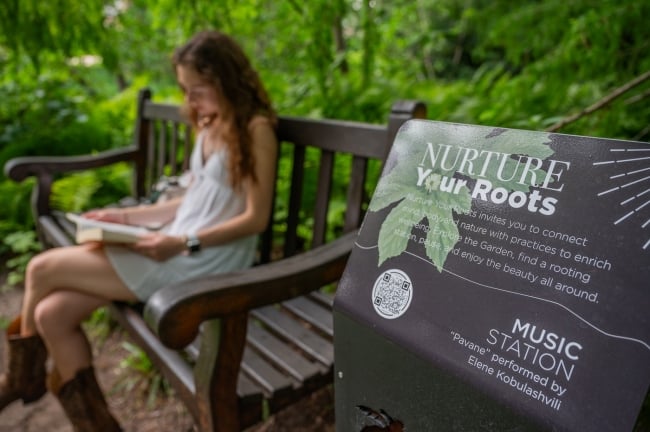You have /5 articles left.
Sign up for a free account or log in.

The Nurture Your Roots program includes QR codes around the Beal Botanical Garden that students, faculty, staff or other garden visitors can scan to practice wellness and reflection. Each station has content contributed by community members.
Michigan State University
When 2023 Student Voice survey by Inside Higher Ed and College Pulse asked students about health-related goals, 43 percent of respondents wanted to work on spending more time outside and 36 percent wanted to practice mindfulness more often.
Michigan State University established a program in the five-acre garden space to promote healthy living among learners and other community members.
The Nurture Your Roots program includes guided nature walks, mindfulness practices and yoga, helping individuals connect with their mind and body, as well as nature, through holistic practices.
The garden: The Beal Botanical Garden and Campus Arboretum is a well-known fixture on MSU’s campus and the longest running continuously operated botanical university garden in the U.S., celebrating 150 years in fall 2023.
After the COVID-19 pandemic and remote learning, campus leaders wanted to do something different with the garden space and, based on community member feedback, elected to focus on well-being.
The garden “aims to promote wellbeing in the MSU community by building off the research showing that being outside supports physical and mental health with increased activity and facilitating connection, relaxation and healing,” according to MSU’s website.
In 2022, garden staff created an interdisciplinary internship program, Beal Scholars, and the student participants led some of the development of the well-being programming, explains Alan Prather, interim director of the Beal Botanical Garden.
“One of our first student scholars, Elliot Pancioli, created a nature journal for visitors, with prompts intentionally connecting wellbeing and nature,” Prather says. “Seeing the power of the journal in practice really inspired us to think about how other kinds of activities, presented in the garden in storytelling fashion and created by folks across our community, could be a powerful way to encourage visitors to explore the connection between nature, the garden and their own wellbeing.”
Finding wellness: Nurture Your Roots invites visitors on a self-navigated series of experiences at different “rooting stations” within the garden focused on health and interconnection. Each experience was developed by an MSU community member drawing on their research or expertise in wellness.
At the entrance to the garden, visitors can pick up a Pocket Journal, created by Pancioli, which encourages inward reflection and grounding oneself in the present moment.
Inside the garden, visitors can participate in each activity by scanning the QR code at the respective spot. Rooting exercises include an adaptive stretching exercise, guided meditation, poetry reading or just sitting on a bench and listening to music for meditation, all led by students, faculty or staff in a video format. Each webpage also features a short bio from the contributor and their feelings about wellbeing, art and nature.
The garden is free and open to the public, so visitors can engage with the garden how they please.
The impact: Since the creation of Nurture Your Roots, community members have expressed that they appreciate the offerings because they are “diverse, unique and significant to campus,” says Angelica Bajos, community and sustainability coordinator at the garden.
In the future, garden staff plan to reimagine rooting stations each year to keep innovating and experimenting with different campus creators, Prather says. “That’s part of what we feel makes this program so dynamic, that the content is created by artists and wellbeing experts on our campus.”
Staff also hope to increase the reach of the program. Curricular partnerships with faculty to integrate nature and well-being into courses have grown over the past year to 38, including the new African American and African Studies program at the university. Each course visits the garden in some capacity, boosting student awareness of how the garden can benefit their health and wellness.
Another future consideration is making offerings available throughout all seasons. “As you can imagine in Michigan, there are months where spending periods outside is more challenging!” Prather says.
This past year, Beal piloted a virtual greenspace project in a campus residence hall, which helped students immerse themselves in a nature-like environment with wellbeing activities and therapy dogs. The campus also includes an arboretum with over 20,000 trees, so implementing forest therapy training among the team is another ambition among staff, Prather adds.
Get more content like this directly to your inbox every weekday morning. Subscribe here.








